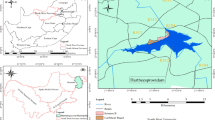Abstract
Despite global interest in women's safety specifically in urban contexts, there is little attention given to the modernist move towards functionalist cities without people. This absence of publicness has done little to engender women's rights to the city and their right to public collective spaces. Yardena Tankel addresses this lack of critical attention within ‘safe city for women’ discourse and examines the ways in which women in Recife, Brazil have organized through feminist networks to reclaim public space and bring collective visibility to women's diverse needs and multifaceted experiences of insecurities.
Similar content being viewed by others
References
Amnesty International (2008) Picking Up the Pieces: Women's experience of urban violence in Brazil, London: Amnesty International.
Bunch, Charlotte (2004) ‘A Feminist Human Rights Lens’, Peace Review: A journal of social justice 16 (1): 29–34.
Burgess, Rod (2010) ‘Violence and the Fragmented City’, in Ana Falu (ed.) Women in the City: On violence and rights, Santiago de Chile: Women and Habitat Network Latin America.
Cornwall, Andrea and Anne Marie Goetz (2005) ‘Democratizing Democracy: Feminist perspectives’, Democratization 12 (5): 783–800.
Dammert, Lucía (2008) ‘Between Indistinct Fear and the Reality of Female Victimisation in Latin America’, in Ana Falu and Olga Segovia (eds.) Living Together: Cities free from violence against women, Santiago de Chile: Red Mujer y Hábitat de América Latina.
Dury, Raymond (2008) Foreword, in Kathryn Travers, Sophie Ballu, Farida Danmeri, Carlos Guajardo García, Manar Idriss, Jessica Kramer and Michelle Virgin (eds.) Women's Safety: A shared global concern. Compendium of Practices and Policies, Montreal: International Centre for the Prevention of Crime, pp VII.
Falu, Ana (2010) ‘Violence and Discrimination in Cities’, in Ana Falu (ed.) Women in the City: On violence and rights, Santiago de Chile: Women and Habitat Network Latin America.
Harcourt, Wendy (2010) ‘Empowerment, Women's Bodies and Freedom: In conversation with Khawar Mumtaz and Jacqueline Pitanguy’, Development 53 (2): 150–155, (2): 156–160.
Koskela, Hille and Rachel Pain (2000) ‘Revisiting Fear and Place: Women's fear of attack and the built environment’, Geoforum 31 (2): 269–280.
Lemanski, Charlotte (2006) ‘Residential Responses to Fear (of Crime Plus) in Two Cape Town Suburbs: Implications for the post-apartheid city’, Journal of International Development 18 (6): 787–802.
Portella, Ana Paula (2005) ‘Portal Violência contra a Mulher’, http://copodeleite.rits.org.br/apc-aa-patriciagalvao/home /noticias.shtml?x=731, accessed 10 April 2010.
Scheper-Hughes, Nancy and Philippe Bourgois (2004) ‘Introduction: Making sense’, in Nancy Scheper-Hughes and Philippe Bourgois (eds.) Violence in War and Peace: An anthropology, Malden: Blackwell Publishing.
Segovia, Olga (2010) ‘Coexisting in Diversity: Public space from a gender perspective’, in Ana Falu (ed.) Women in the City: On violence and rights, Santiago de Chile: Women and Habitat Network Latin America.
Tamayo, Giulia (2010) ‘Current Debates on Safety: A women's human rights perspective’, in Ana Falu (ed.) Women in the City: On violence and rights, Santiago de Chile: Women and Habitat Network Latin America.
Tiesdell, Steve and Taner Oc (1998) ‘Beyond “Fortress” and “Panoptic” Cities – Towards a safer urban public realm’, Environment and Planning B: Planning and design 25: 639–655.
Vargas, Virginia (2007) ‘Regional Programme Cities without Violence against Women, Safe Cities for All: Public spaces, citizen safety and gender-based violence. Reflections emerging from debates in Latin America’, Edited by UNIFEM: Women and Habitat Network of Latin America and the Caribbean, pp 1–69.
Additional information
Examines the ways in which women in Recife, Brazil have organized through feminist networks to reclaim public space
Rights and permissions
About this article
Cite this article
Tankel, Y. Reframing ‘Safe Cities for Women’: Feminist articulations in Recife. Development 54, 352–357 (2011). https://doi.org/10.1057/dev.2011.61
Published:
Issue Date:
DOI: https://doi.org/10.1057/dev.2011.61



